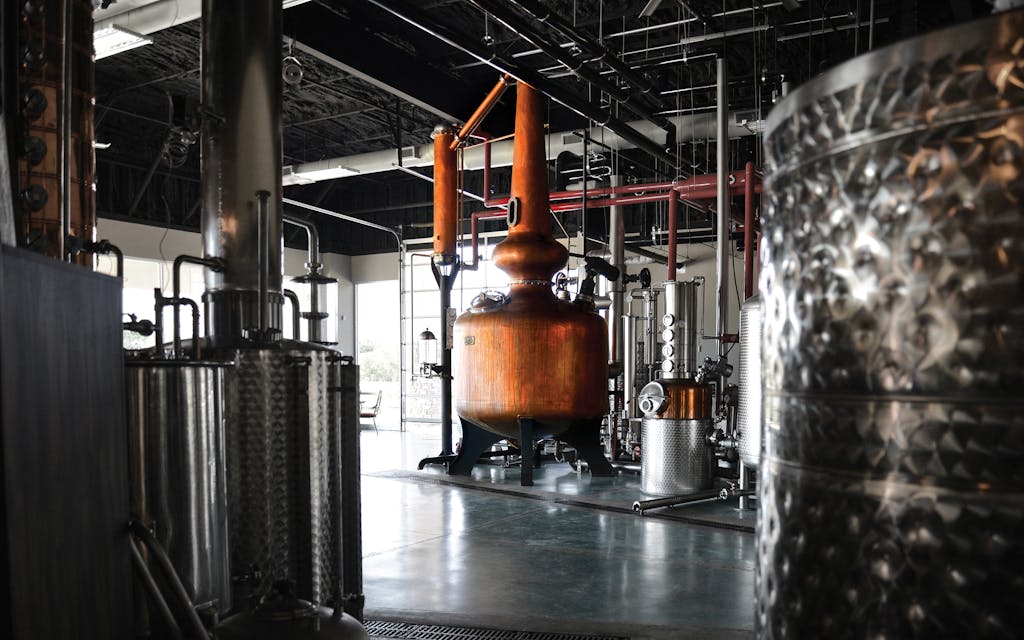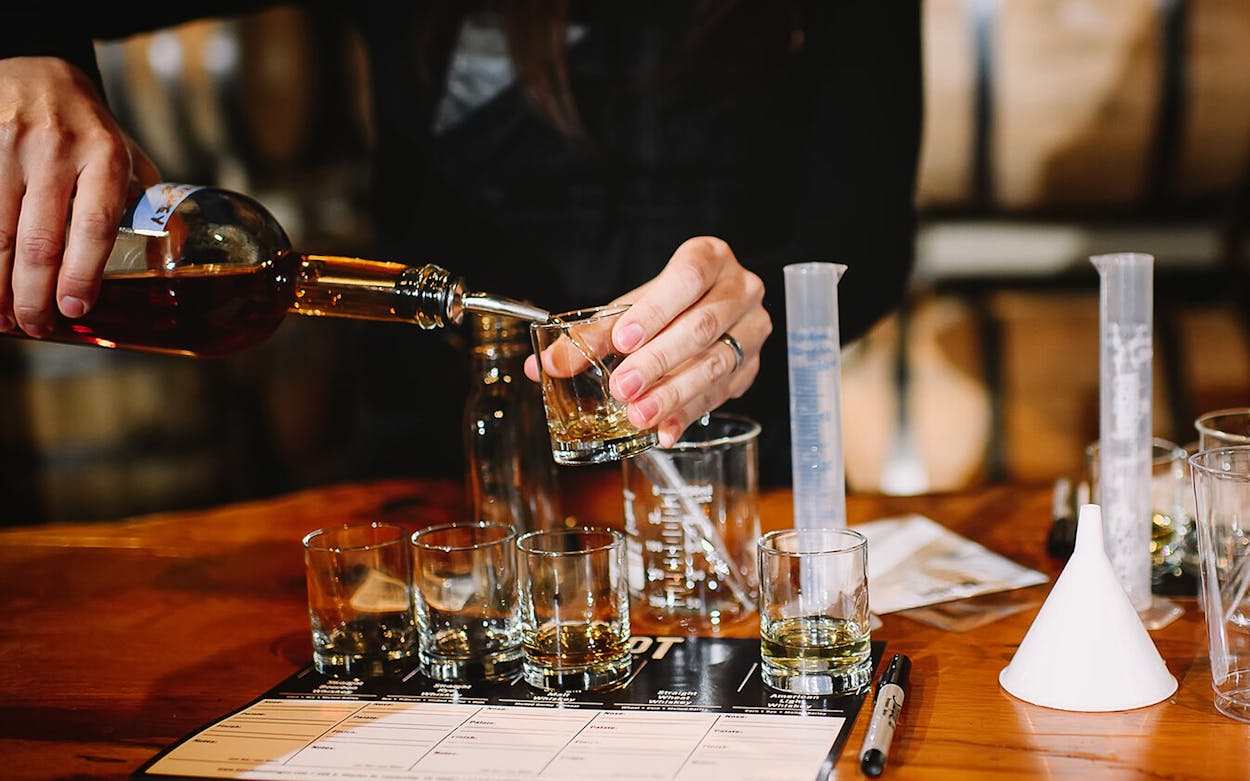Featured in the Dallas City Guide
Discover the best things to eat, drink, and do in Dallas with our expertly curated city guides. Explore the Dallas City Guide
“I don’t have to knock your socks off and make you cringe,” says Natasha DeHart, the co-owner, with her husband Ryan, of Bendt Distilling Co. “We don’t have to impress people. We don’t need the pretension. You don’t have to spend a hundred dollars on a bottle of whiskey to enjoy it.”
I’m at the bar in the Bendt tap room, a renovated former Piggly Wiggly grocery store in Lewisville, enjoying the warehouse-chic vibe that reminds me of Austin—single bulbs dangling artfully from exposed pipes on the ceiling, polished-wood stools, brown leather couches. I’m sipping No. 5, a blend of malt, bourbon, rye, and wheat and light whiskeys. In 2012, Bendt was among the first wave of distilleries in Dallas–Fort Worth. Today the scene is booming, with 35 distilleries, or licensed manufacturers of liquor, scattered throughout the Metroplex, according to the Texas Alcoholic Beverage Commission. As of 2019, there’s even a distillation-science track at Grayson College in Denison. Lightweight that I am, I’m spreading out my distillery-hopping over a few days, and constantly refilling my water bottle and eating cashews in the back of the Uber to stay closer to the sober side of the spectrum.
The bourbons, single malts, and gins I taste are worth losing a day to, and if you’re enticed to do the same, I recommend doing it soon—before the secret gets out and the lines get long. “DFW distilleries are going to expand the way Fredericksburg expanded with wineries,” predicts Robert Del Grande of New Artisan Spirits. The DFW spirits scene is following the trajectory of the wider Texas spirits scene, which is following the trajectory of the nationwide spirits scene. What happened to craft beer—before the coronavirus pandemic, craft beer sales across the U.S. followed a steady upward trajectory, nearly tripling between 2011 and 2019—is likely about to happen to craft liquor.
Bendt No. 5 is indeed “unpretentious,” as well as intriguingly drinkable. I don’t grimace or clutch my burning chest, the way I’ve historically responded to whiskey; it goes down smooth and easy. “It’s approachable,” DeHart says. “It should be enjoyed daily. Don’t save your favorite dress for your funeral, that’s what my grandmother used to say.”
Perhaps the most distinctive feature of the DFW craft spirits community is that it’s deeply Texan: a distillery in Fort Worth housed in the former Ranch Style Beans plant, a vodka maker in Garland whose grandfather was a pioneer in the Texas fruit juice business, another Fort Worth distiller who handcrafts his vodka with black-eyed peas. Local liquor lovers and tourists can shape a fun, educational weekend around distillery hopping and tasting-room sipping throughout the Metroplex. (Rock-paper-scissors for designated driver.) “Start at a good whiskey bar,” DeHart suggests. Her top choice is Bowen House, which carries a variety of local spirits
A solid whiskey bar like Bowen House will have experts behind the bar to evaluate your palate and point you to the next stop on any self-guided distillery tour. They may direct you to Fort Worth, where Firestone & Robertson Distilling Co. slings bourbon brewed with a yeast strain they discovered on a Texas pecan, and where Acre makes a single malt with locally sourced and malted barley. If they really respect you, they might send you as far north as Denison, where Ironroot Republic proudly makes corn whiskey—more or less moonshine, and therefore not traditionally a respectable choice. And yet, as per the life cycle of uncool things, a couple of brothers in the middle of nowhere went and made it cool.

Although the Texas craft distillery scene is hundreds of years younger than those of Kentucky or Scotland, Texas distillers have an advantage. As engineer Jonathan Likarish, one of two red-headed brothers at the helm of Ironroot Republic, points out, Texas is a state of extremes. “Super hot summers. Really windy. Tornados. Barometric pressure. Shifts in weather can accelerate the aging process, so younger whiskey from Texas can compete with older products from traditional producing regions.” DeHart concurs: “What takes decades in more temperate climates is accelerated by the extremes we see here.”
Case in point: Ironroot’s Harbinger 115 was the first bourbon from outside of Kentucky to win “world’s best bourbon” at the World Whiskies Awards. (It’s a myth that bourbon has to come from Kentucky. The only geographical requirement for bourbon is that it be made in the United States.) “We could control the temperature,” Likarish says. “We could mimic the weather patterns of Kentucky with the right air conditioning and heat. But we want it to taste like it’s from Texas.” As he explains, the more volatile the weather, the faster the whiskey will extract flavor components from the barrel. (Next time you’re cursing the Texas heat, know that nearby the distillers are celebrating.)
Harbinger 115 is so named because the whiskey is 115 proof. I take the smallest sip. Maple syrup on the nose, chocolate and tobacco on the back end, fire in my throat. “Tastes like brunch,” Likarish says proudly.
While Denison might not be the first place the average distiller would venture to set up shop, the city boasts quite a precedent. In 1876, grape horticulturist T.V. Munson began working there with Texas rootstalk, which was resistant to the majority of American diseases that affect grapes. When one of those American diseases, phylloxera, made its way across the ocean to France and decimated most grapes in the Cognac region, Munson was equipped to help because he knew which American grape rootstock would adapt to the French soil and climate. He is credited with saving the French wine industry, and Cognac and Denison are now sister cities.
To bring the story full circle, the Likarish brothers studied with French cognac masters, whose technique, known as “élevage,” they apply to whiskey making. Élevage entails consistent intervention throughout the aging process—in-cask watering, for example, as opposed to adding water after pouring the product from the barrel—as a means of improving the flavor.
The Likarish brothers also apply the élevage mantra “sense of place” to their whiskeys, sourcing 95 percent of their grains from within sixty miles of the distillery. “We use heirloom corn from Muenster, west of thirty-five,” Jonathan Likarish says. “The guy over there was in my wedding.”
DFW’s distillery community, in general, is made up of friend groups and families. Will Short at New Artisan Spirits, for example, is the son of former Coca-Cola executive Donald Short, who founded the spirits brand a decade ago along with his friend, James Beard Award–winning chef and biochemist Robert Del Grande. They never owned their own distillery, so Will Short is in the process of opening one, complete with a hip tasting room, off Interstate 35 and Mockingbird Lane, ten minutes from downtown Dallas. Out front, there’s a little herb garden where Short plucks rosemary, Thai basil, and other plants for cocktail garnishes; inside, there’s a party-ready event space hugged by barrels and stills. I sit at New Artisan’s bar sipping the only gin I’ve ever tasted that I wouldn’t bother mixing or even pouring over ice. It’s steeped with twelve botanicals, including Texas pecans, as well the zest of lime and grapefruit peels from nearby Buda Juice.
The mounting interest in craft spirits means increased demand, creating room not just for fresh faces like Will Short’s but for those who have been in the business for years to experiment and grow. “I’ve always liked innovating,” says Del Grande, who, back in the eighties, with Dallas celebrity chefs Dean Fearing and Stephan Pyles, helped develop what is now known around the world as Southwestern cuisine. At New Artisan, he is about to release a “botanical bourbon” made from bourbon steeped in gin botanicals such as juniper.
“People like knowing that what they’re drinking isn’t some abstract thing,” Del Grande says. “They like to touch it, taste it, see it where it’s made. It’s that ‘backstage pass’ feeling.”
Curious drinkers can also sign up for an actual backstage pass, a.k.a a distillery tour. You can see stills, learn each distillery’s process and story, and then taste the products with newfound appreciation. It’s easiest to go tasting in sections of the Metroplex that boast clusters of distilleries in one place: make an afternoon of checking out a few around downtown Dallas, or a few in Fort Worth—and hit the outliers such as Ironroot as one-offs. Enjoy your backstage pass, your flight of whiskeys, and this little pocket of Texas culture. “We love to ramble on about whiskey,” Likarish says. If you know what’s good for you, you’ll let him.
- More About:
- Libations
- Fort Worth
- Dallas






